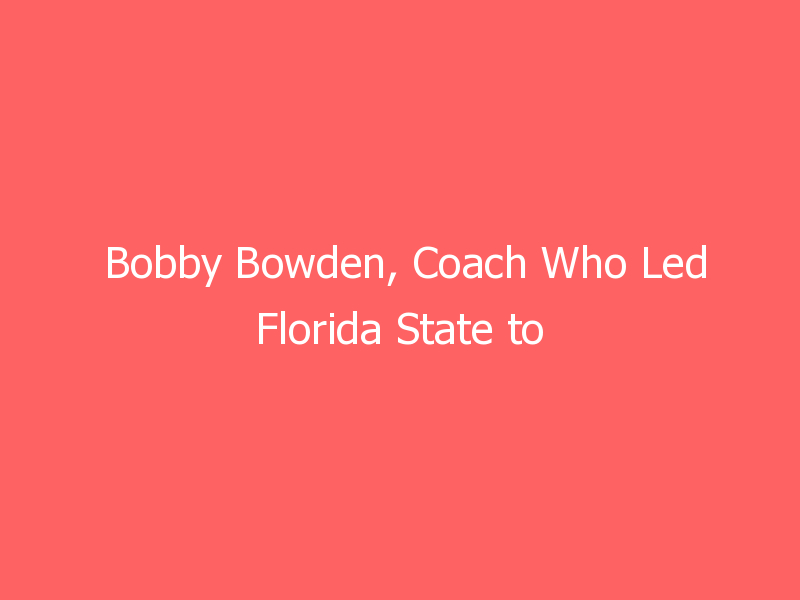Bobby Bowden, Coach Who Led Florida State to Greatness, Dies at 91
Advertisement
Continue reading the main story
Supported by
Continue reading the main story
Bobby Bowden, Coach Who Led Florida State to Greatness, Dies at 91
He transformed the Seminoles into a national powerhouse, and ended his career second only to Joe Paterno in major college football victories.
Bobby Bowden, the Florida State head coach, in 2008. His 377 victories, 129 losses and four ties placed him No. 2 in career coaching wins.Credit…Marc Serota/Associated Press
Bobby Bowden, the folksy showman who transformed Florida State University into a national football powerhouse and became the second-winningest coach in the history of major college football, died on Sunday at his home in Tallahassee, Florida. He was 91.
His death was announced by Florida State.
Bowden’s health had declined after he was found to have Covid-19 in early October. Last month, his son Terry said that Bowden had pancreatic cancer.
When Bowden became the Florida State coach in 1976, he inherited a program that had won only four games over the previous three seasons. The modest crowds at the Seminoles’ Doak Campbell Stadium in Tallahassee had plenty of room to stretch on the metal bleachers.
“When I was at Alabama the bumper stickers read ‘Beat Auburn,’ he recalled in “The Bowden Way” (2001), his book on leadership written with his son Steve. “When I was at West Virginia they read ‘Beat Pitt.’ When I came to F.S.U., the bumper stickers read ‘Beat Anybody.’”
Bowden’s Seminoles beat most everybody. He coached Florida State to national championships in 1993 and 1999 and his teams finished in the top five of the Associated Press rankings every season from 1987 to 2000. The Seminoles were unbeaten in bowl games from 1982 to 1995.
Bowden was carried on the shoulders of Willie Jones (88) and Ron Simmons (50) after Florida State defeated the University of Florida 37-9 in December 1977.Credit…Associated Press
The luster eventually dimmed. When Bowden was forced into retirement by the Florida State administration — his last game was a Gator Bowl victory over West Virginia on Jan. 1, 2010, concluding a 7-6 season — he left behind a football program that was foundering and had been engulfed in scandal.
But his 377 victories, 129 losses and four ties in his 44 seasons, at Samford, West Virginia and Florida State, placed him No. 2 in career coaching wins behind Joe Paterno, the Penn State coach.
When Paterno was fired in November 2011 after his top assistant, Jerry Sandusky, was indicted on child sex abuse charges, the N.C.A.A. vacated all 111 of Paterno’s wins from the record book dating back to 1998, when the Sandusky inquiries were said to have begun.
With Paterno’s victory total of 409 reduced to 298, leaving him seventh in career wins, Bowden supplanted Paterno as No. 1 in July 2012. “There is no rejoicing in the Bowden household,” Bowden said at the time. “Nobody would want to have a title given to him this way.”
But in January 2015, as part of a settlement in a lawsuit brought by Pennsylvania officials, the N.C.A.A. agreed to restore Paterno’s victories, returning him to the No. 1 spot.
Bowden had already seen his own victory total depleted in 2010, when Florida State was forced to vacate 12 football wins from the 2006 and 2007 seasons as part of an N.C.A.A. punishment for an academic cheating scandal involving dozens of athletes. (Bowden was not implicated in wrongdoing.)
When the N.C.A.A. restored the 111 victories taken away from Paterno, Bowden remarked in an A.P. interview, “By the way, am I going to get my 12 back now?”
Bowden was elected to the College Football Hall of Fame together with Paterno in 2006, when the National Football Foundation waived its rule requiring hall inductees to be retired. Bowden and Paterno each received the foundation’s Gold Medal, its highest award.
Bowden remained a celebrity on campus after his retirement, his teams having won 304 games, lost 97 and played four ties.
His likeness in bronze stands outside the university’s Moore Athletic Center and is re-created in a stained-glass window at the Seminoles’ football stadium, whose surface is named Bobby Bowden Field.
Bowden spoke often of his Christian faith; he didn’t smoke or drink, and “dadgummit” seemed the sharpest word in his vocabulary. He was also a showman who loved the microphone and was given to backslapping people he had just met. He appeared to be the prototype of the country boy, though: “Bobby’s never lived in the country in his life,” his wife, Ann, once wrote in The Tallahassee Democrat. “He was raised on concrete.”
And he could display a will of iron.
“The thing about Bobby is that he comes off as such a nice, sweet Southern boy that people underestimate him,” Vince Gibson, a childhood friend and Bowden’s assistant when he coached at South Georgia College, once said. “He’s a tough guy and can be a hard one when he wants.”
Robert Cleckler Bowden, known to everyone as Bobby, was born on Nov. 8, 1929, in Birmingham, Ala. His father, Bob, was a banker, and his mother, Sunset (Cleckler) Bowden, was a homemaker.
He was an all-state football player at Woodlawn High School, graduating in January 1949, and entered the University of Alabama in Tuscaloosa hoping to play quarterback. He practiced with the freshman team, but left school after a few months and returned to Birmingham to marry his high-school girlfriend, Julia Ann Estock. He was 19; she was 16.
Bowden played quarterback for Howard College in Birmingham (now Samford University), from which he received a bachelor’s degree. He remained at Howard for the next two seasons as an assistant coach while earning a master’s degree in education from George Peabody College in Nashville, now a part of Vanderbilt University.
Bowden was head coach at South Georgia, a junior college, from 1956 to 1958. He became the head coach at Howard in 1959 and went 31-6 in four years there with an assist from the Alabama coach, Bear Bryant, who tipped him off to Crimson Tide substitute players he was willing to transfer to Howard. After stints as an assistant coach, Bowden became head coach at West Virginia in 1970, and posted a record of 42-26 for six seasons.
Then he embarked on his long run at Florida State.
Bowden was a brilliant recruiter, searching for players in Miami’s poorer neighborhoods and the rural parts of the Florida Panhandle. “I like people,” he told The New York Times in 2000. “I like meeting their daddies and grandmas and visiting with them. It’s not work at all.”
As for Bowden’s X’s and O’s: “He’s always been ahead of most people when it comes to being innovative,” Paterno once told ESPN. “You’d think the guy would run out of ideas, but, geez, he doesn’t.”
Bowden sent dozens of Seminole players to the National Football League, among them the Heisman Trophy-winning quarterbacks Charlie Ward and Chris Weinke, defensive back Deion Sanders, running back Warrick Dunn and linebacker Derrick Brooks.
Bowden celebrated an Orange Bowl victory against Nebraska in 1994.Credit…Doug Mills/Associated Press
Recruits who played for Bowden were exposed to his belief in the importance of religion. Before the season openers, he would take his entire team to a pair of church services, one in a predominantly white area and the other in a mostly Black neighborhood.
“Most parents want their boys to go to church,” he said. “I’ve had atheists, Jews, Catholics and Muslims play for me, and I’ve never not started a boy because of his faith. I’m Christian, but all religions have some kind of commandments, and if kids would obey them, the world would be a better place.”
At the start of each practice, Bowden would ascend a steel tower — the former Seminole defensive back and N.F.L. player Terrell Buckley called it “the tower of power” — where he would make notes on good plays and botched assignments for his next day’s meeting with his assistant coaches.
Bowden applied what he viewed as the lessons of the battlefield to the football field. While bedridden with rheumatic fever at age 13, he had listened to radio broadcasts telling of World War II battles, and he later studied the campaigns of Patton, MacArthur and Germany’s Erwin Rommel.
“They all demonstrate discipline,” Bowden once said, “and that you need reserves so that if you’re getting annihilated on one front, you can attack somewhere else.”
For all of Bowden’s achievements, dents were eventually made in Florida State’s winning ways. Bowden’s son Jeff, his offensive coordinator, left after the 2006 season, when Florida State was shut out for the first time in 233 games. The Seminoles lost 17 games from 2005 to 2007.
When Florida State lost to Kentucky in the Music City Bowl on Dec. 31, 2007, the team was missing 23 scholarship athletes, seven of them starters and some having been suspended in the academic cheating scandal.
In addition to his wife and his sons Jeff, Steve and Terry, Bowden’s survivors include another son, Tommy, a former head football coach at Tulane and Clemson; and his daughters, Robyn Hines and Ginger Madden; and many grandchildren.
Terry Bowden is the head football coach at the University of Louisiana Monroe and was previously head coach at Salem, Samford, Auburn, North Alabama and Akron.
Despite setbacks late in his career, Bowden remained an icon for many Florida State fans.
He was sometimes known as Saint Bobby, in good measure a reflection of his religious faith. But he saw something of an edge in the sobriquet, perhaps an image mostly propagated by rival fans of the University of Florida.
“The folks who started calling me Saint Bobby were the ones who put a little twist in their voice when they said it,” Bowden wrote in his 1996 book “Winning’s Only Part of the Game,” an exchange of views with his children.
“I’ve been fighting that goody-goody stuff for years, because if you let people make you out to be perfect there just ain’t no margin for error,” he told his children. “There’s only one person who’s ever been perfect on this earth, and He ain’t your daddy.”
Originally found on Read More








